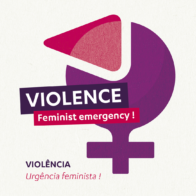We, the feminists of dei Lénk, say it loud and clear: the fight against gender-based violence is a feminist emergency! This violence suffered by women and members of the LGBTIQ+ community does not fall from the sky. It is strongly rooted in a capitalist and patriarchal system that oppresses and exploits people of color, migrants, the poor and it particularly attacks women.
What is gender-based violence?
Gender-based violence refers to any act of violence based on socially ascribed gender differences between women and men. Gender-based violence means the power relations between the feminine and the masculine. Gender-based violence is physical, sexual, mental/psychic or economic violence inflicted on a person, usually a woman or a girl. It includes homophobic and transphobic violence where people do not conform to the male or female gender. This means that anyone who identifies as a woman – regardless of her intimate, gender-conscious experience – is exposed to this systemic violence.
Genital mutilation, forced marriages, rape as a weapon of war, feminicide are abject expressions of gender-based violence. In a capitalist, patriarchal and heteronormative society, we are confronted with this violence all the time.
Globally, one in three women has been a victim of gender-based violence. In Luxembourg, a recent survey indicates that 20% of women aged 16 to 74 have been affected by physical, sexual or psychological violence at least once during the year 2019/2020.
The feminists of dei Lenk are sounding the alarm. Action is needed now, immediately, because it is urgent!
Quantify/count violence against women
In Luxembourg there is a growing lack of statistics, figures and studies on violence against women. How can we eradicate this violence if we don’t even have information on its context and extent? We need data on the social conditions of both victims and perpetrators.
The government is seriously lagging behind. We need more surveys and accurate data!
- The only reference for statistics on gender-based violence is the « Violence Report » of the inter-professional cooperation committee (Ministry of Equality F/H, Ministry of Justice, Ministry of Internal Security, Police G-D, Luxembourg and Diekirch Public Prosecutors’ Offices, Service d’Assistance aux Victimes de Violences Domestices, Service d’Aide aux Perpetres de Violence Domestices, etc.), which mainly lists cases of domestic violence.
- In the absence of a precise methodology for collecting data on domestic violence, the figures tell us little about the sociological context in which the violence took place.
- In order to better combat domestic violence and to better support victims and discourage potential perpetrators, we need knowledge:
- Which acts of violence are most frequent (rape, sexual assault, physical assault, harassment …)? Who is affected (men, women, non-binary people, children and other family members)? What is the economic and social situation of these people (professional category, unemployed, income category, dependent children)? What are their housing conditions?
Alerted to gender-based violence, dei Lénk appealed to the competent ministers via parliamentary questions questioning, among other things, the lack of data on gender-based violence, the procedure for expelling an abusive partner and the places available in shelters for women in distress, as well as the situation of women prisoners and intersex and non-binary people.
dei Lénk also opened the debate on Gynaecological and Obstetric Violence (GVW) in the Chamber of Deputies.
Inclusion of femicide in the Penal Code
Thousands of women around the world are murdered by their partners or ex-partners, or by men who hate women. This extreme violence is gender-based and a fatal expression of male domination. Like e.g. Italy, Spain and Belgium, Luxembourg should recognise that this is a specific form of violence that needs to be quantified and enshrined in the Penal Code.
Feminicide is the murder of a woman because of her gender, often by her partner or ex-partner (in about 40% of cases). It is a clearly macho and misogynistic violence whose perpetrators are mostly men. Feminicide must therefore be seen in relation to the evolution of unequal gender relations.
dei Lénk has been fighting since 2020 for the recognition of the term « feminicide » to designate a specific form of gender-based violence that is neither counted, nor judged and sanctioned as such.
For déi Lénk, this political and social recognition of « feminicide » must also include legal recognition. We have asked the question of the inclusion of feminicide in the Penal Code to the Ministers of Justice and of Gender Equality – twice!
The competent ministers consider that this is not necessary:
« Only murder and assassination do not carry a more severe penalty, the punishment being life imprisonment in all cases. It is therefore not necessary to introduce the term femicide into the Penal Code as an aggravating circumstance, in view of the legislation already in place since the 2003 Act. An ‘over-aggravation’ of the offence is not appropriate and has no practical benefit. »
Legal recognition of feminicide cannot be reduced to a question of sanctions and punishment. On the contrary, it would allow for the establishment of a process of judgement and evaluation of sentences that takes into account gender issues and unequal relations between men and women. In fact, since 2004, Spain has set up specific courts for cases of domestic violence, which has led to a 24% reduction in feminicides!
A complaint registration and monitoring system that delivers justice to victims of violence:
In Luxembourg, only 7.5% of complaints filed are followed up. When filing a complaint, victims are often poorly received. The police lack the staff, resources and training to be able to deal with complainants properly. They must be given these resources!
We do not deny that the police and the judiciary are institutions that can themselves be generators of gender violence and sexism – such as when a police officer refusing to take into account the complaint of a rape victim, or when victim blaming is practised, or when the judicial procedure is too long and the complaint is filed without follow-up. However, victims cannot play vigilante. We need a judicial system that can deal effectively with people and their complaints. It would be a good idea for victims to be heard first by social workers, who would draw up an initial report to be used as a basis for registering a complaint in a police station.
The obstacles to filing a complaint sometimes hit the absurd. For example, dei Lénk was alerted to a case of refusal to register a complaint of domestic violence on the grounds that an impartial translator was not available to assist the officer in recording the complainant’s story.
Sheltering and protecting victims of domestic violence :
How can a woman leave her abusive partner if she cannot afford to move and shelters are full? Homeless women are extremely vulnerable to sexual violence. We need more social housing and space in shelters! Migrant women have suffered gender-based violence in their countries of origin, but do not have a clear right of asylum in Luxembourg. Luxembourg must respect its commitments to the Istanbul Convention!
The housing crisis disproportionately affects single-parent families, the majority of whom are women. For poor women, migrant women and people of colour, the lack of access to housing in the case of domestic violence is a double violence suffered. déi Lénk is committed to fighting the housing crisis, real estate speculation and the laissez-faire attitude of the government. With its campaign Wunnen ass kee Business déi Lénk presents solutions to the crisis and provides important information on tenants’ rights.
In the middle of Orange Week, the shelters for women in distress are sounding the alarm: about 70 people are currently on waiting lists to get a place in a shelter and therefore safe from violence. As an answer to this, dei Lénk has sent a parliamentary question to the Minister for Equality between Women and Men. The answer to this question will reveal, among other things, whether Luxembourg complies with the provisions of the Istanbul Convention regarding access to shelters and reception facilities for women in distress for women who do not have a valid residence permit.









